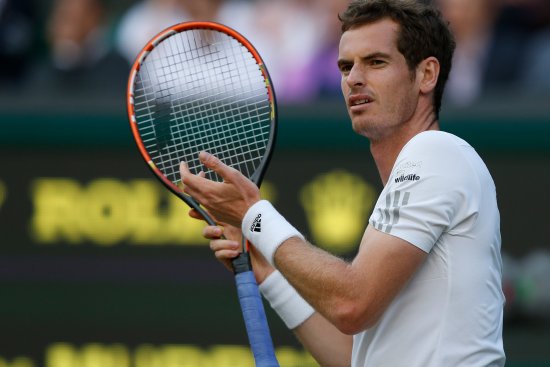
As polling opens, Murray uses Twitter to urge a Yes vote
Game, set and match to Scottish independence? Hours before polling stations opened in Scotland this morning, Scottish tennis star Andy Murray finally revealed his support for the Yes campaign, saying that the negative campaign tactics of the No camp had swung his views. “Huge day for Scotland today!” he tweeted to 2.71 million followers.
For much of the referendum campaign, the pro-union Better Together camp has been guilty of complacency, assuming that its hefty poll lead was solid. In the final weeks ahead of the vote, as the polls narrowed to within touching distance and then narrowed again, that complacency has turned to panic. The panic has revealed how little the No campaign understands about why it has lost ground.
In order to try to shore up support for the union, Better Together dispatched the very people that have helped push voters into the Yes camp—politicians from the U.K. parliament in Westminster—to trot out exactly the arguments that, if polls are right, have failed to convince at least half of Scotland.
So Scottish voters have been treated to a visit from Prime Minister David Cameron, who came close to tears in begging for them to preserve the union. (Inevitably voices in the Yes camp suggested he was crying because there will be calls for his resignation if Scotland goes.)
Cameron’s predecessor, Gordon Brown, a Scot, was also wheeled out to make a last-minute plea for unity. And the Labour Party leader, Ed Miliband, was forced to abandon a campaigning stroll in Edinburgh amid heckling, though not before he “made an ill-judged stop in front of a Supercuts hair salon, which prompted a cry of: ‘Supercuts, that’s what you get from the Westminster government’,” as the Daily Telegraph reported.
To be fair, the No campaign has always been at a disadvantage. Its leaders just didn’t understand that fact. All they had on their side was sober-sided logic and the law of unintended consequences that states an independent Scotland won’t be anything like the utopia its proponents suggest.
Supporters of independence have so much more than that: positivity—they get to vote Yes, not No—and romance, excitement, the shimmering chimera of something beautiful and self-created, plus some really powerful heroes. The most potent champion of the union is not even Scottish: it’s the English author J.K. Rowling, who is a longtime Scottish resident, and whose intervention earned her some trolling by so-called “cybernats” (technologically enabled, if emotionally restricted, Scottish nationalists).
The Yes campaign, by contrast, has been able to summon up a whole range of Scottish figures in its support, from the heavily mythologized “Braveheart” William Wallace and Robert the Bruce to the best-ever James Bond and a Hollywood actor who probably should have been James Bond.
Andy Murray—Olympic tennis gold medallist 2012, Wimbledon winner 2013—may not only be the last famous Scot to come out for independence, but the one with the greatest power to sway wavering voters, partly because, as his tweet made clear, he too wavered before deciding how he would vote if he could. (He isn’t a Scottish resident so doesn’t have a ballot.)
Murray also perfectly encapsulates the relationship between Scotland and the rest of the U.K. that is to be tested today. He didn’t like it when the Scottish National Party leader Alex Salmond tried to use his Wimbledon victory to further the cause of independence, but he may have liked his coverage by the London-based British media even less. For years, these news organizations gave him a hard time for being, in their terms, too Scottish: undemonstrative, occasionally dour. Then he started winning and the same media tried to colonize him.
Now he may have delivered an ace.